必修4 Unit 4 Body language语法——现在分词做状语课件 (共31张PPT)
文档属性
| 名称 | 必修4 Unit 4 Body language语法——现在分词做状语课件 (共31张PPT) |  | |
| 格式 | zip | ||
| 文件大小 | 1.5MB | ||
| 资源类型 | 教案 | ||
| 版本资源 | 人教版(新课程标准) | ||
| 科目 | 英语 | ||
| 更新时间 | 2018-12-12 09:43:36 | ||
图片预览

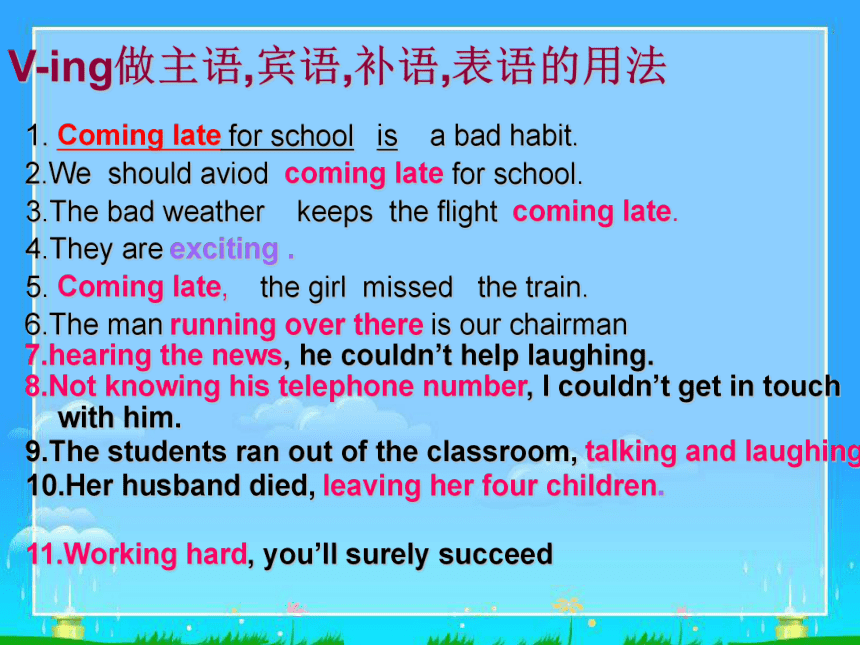
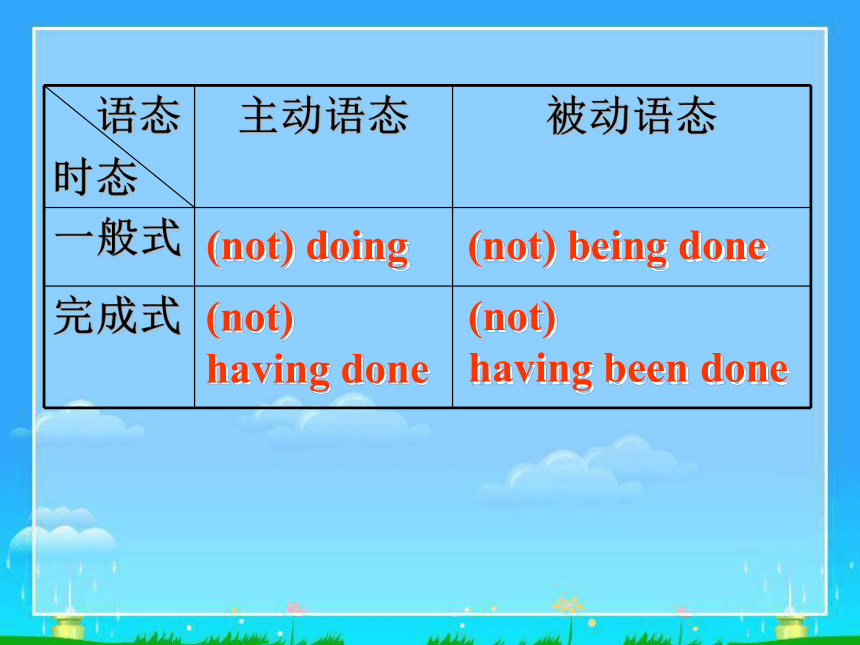


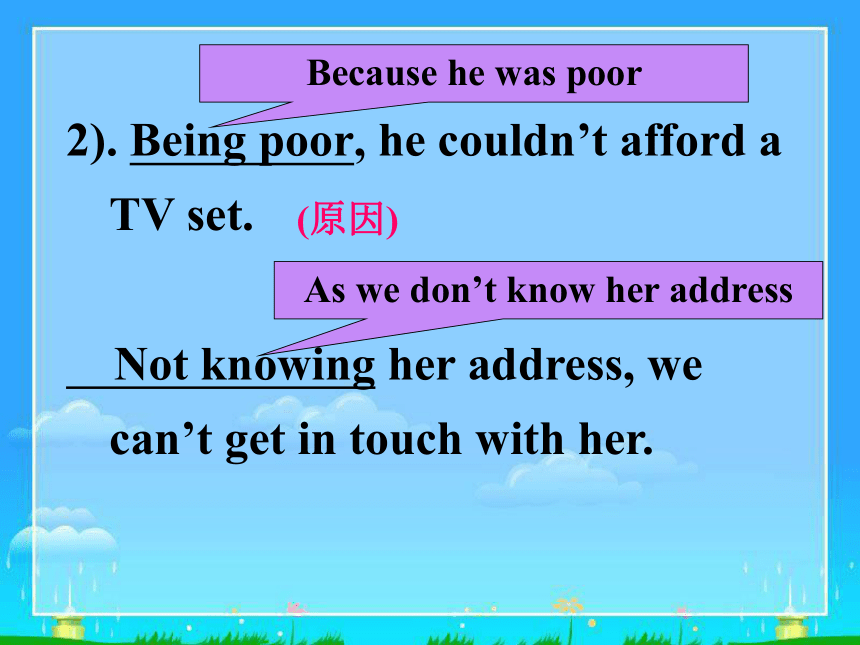

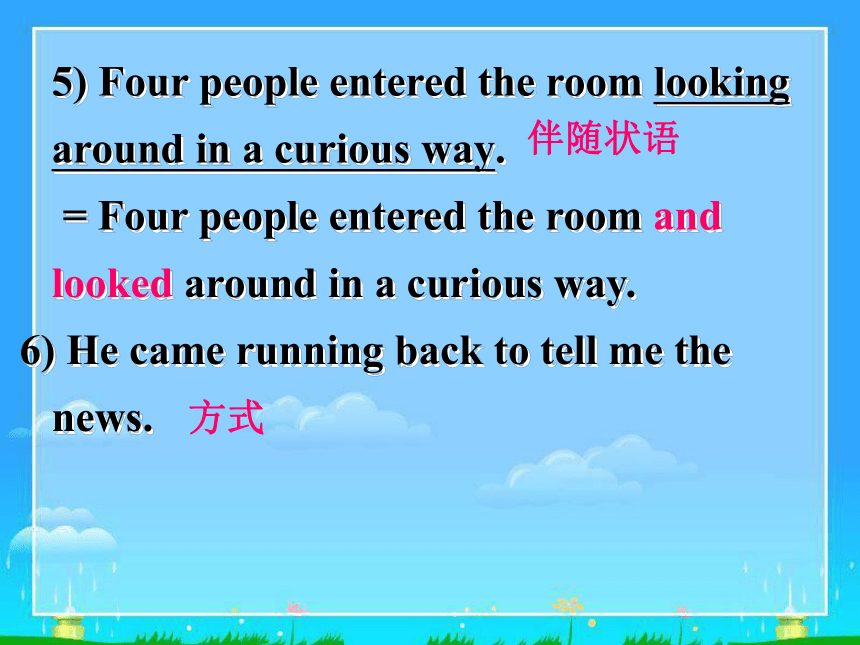
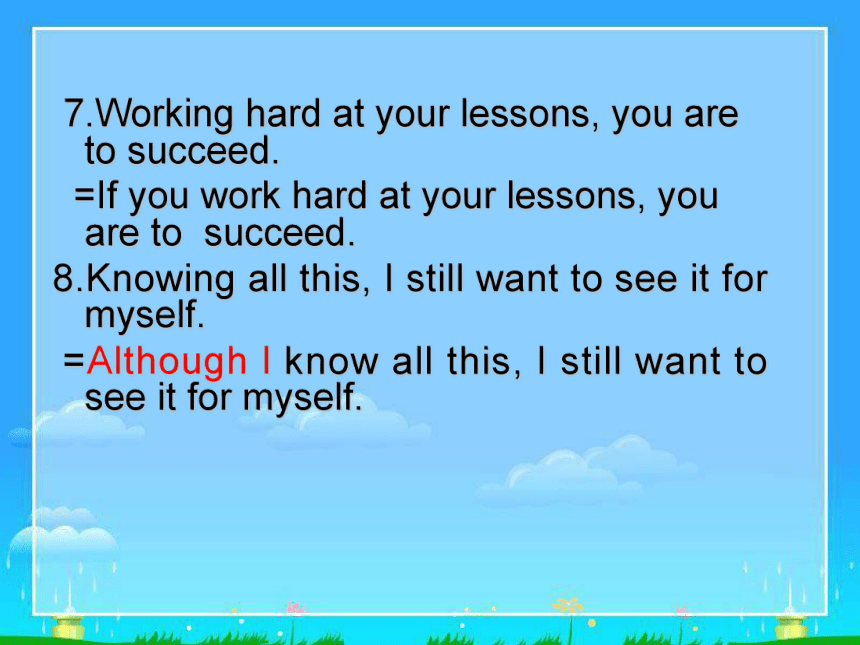


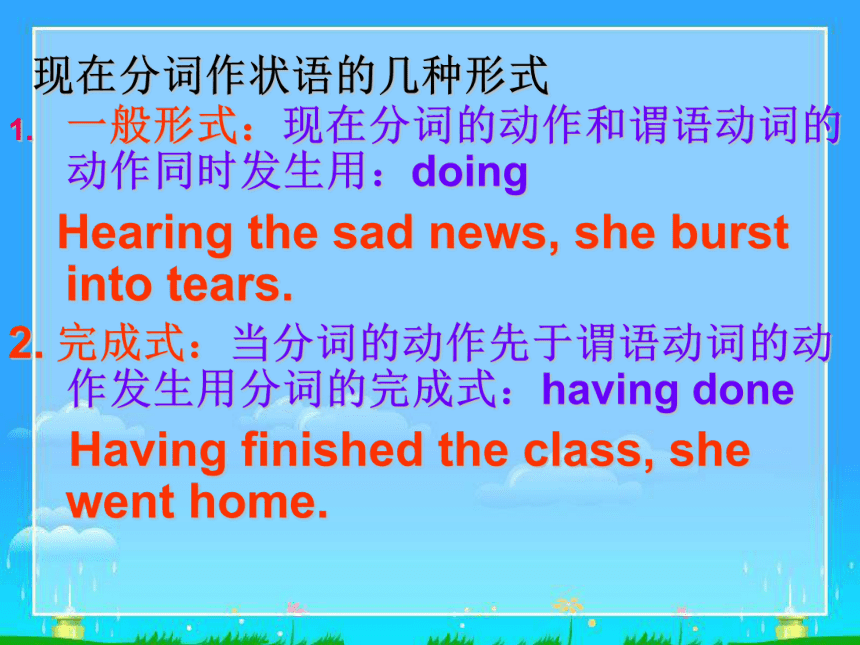
文档简介
课件31张PPT。现在分词做状语V-ing做主语,宾语,补语,表语的用法
1. Coming late for school is a bad habit.
2.We should aviod coming late for school.
3.The bad weather keeps the flight coming late.
4.They are exciting .
5. Coming late, the girl missed the train.
6.The man running over there is our chairman
7.hearing the news, he couldn’t help laughing.
8.Not knowing his telephone number, I couldn’t get in touch with him.
9.The students ran out of the classroom, talking and laughing.
10.Her husband died, leaving her four children.
11.Working hard, you’ll surely succeed
(not) doing(not) being done(not)
having done(not)
having been done V-ing 形式做状语1. 做时间状语
2. 做原因状语
3. 做条件状语
4. 做让步状语
5. 表示方式或伴随情况
6. 做结果状语
7. 评论性状语
可以表示时间, 原因, 结果, 条件, 行为方式或伴随动作等。1).Using your head, you’ll find a good way.
Working hard, you’ll surely succeed.条件状语If you use your headIf you work hard2). Being poor, he couldn’t afford a TV set.
Not knowing her address, we can’t get in touch with her.(原因)Because he was poorAs we don’t know her address3). Walking in the street, I saw a tailor’s shop.
4). His father died, leaving the family even worse off.时间When I was walking in the street.结果and this left the family even worse off 5) Four people entered the room looking around in a curious way.
= Four people entered the room and looked around in a curious way.
6) He came running back to tell me the
news.
伴随状语方式
7.Working hard at your lessons, you are to succeed.
=If you work hard at your lessons, you are to succeed.
8.Knowing all this, I still want to see it for myself.
=Although I know all this, I still want to see it for myself.
评论性状语 有些惯用的V-ing 短语在句中中可以没有逻辑上的主语而独立存在,它们往往作为句子的独立成分来修饰全句,表面说话者的态度观点等。我们称这种状语为评论性状语或评注性状语。 generally speaking 一般来说
strictly speaking 严格来说
roughly speaking 大致来说
broadly speaking 广义上来说
narrowly speaking 狭义上来说
judging from/ by 由...判断
considering 考虑到
frankly speaking 坦率地说
personally speaking 就个人而言
supposing 如果现在分词作状语的几种形式一般形式:现在分词的动作和谓语动词的动作同时发生用:doing
Hearing the sad news, she burst into tears.
2. 完成式:当分词的动作先于谓语动词的动作发生用分词的完成式:having done
Having finished the class, she went home.3. 进行被动式:being done
Being criticised by the teacher, the boy hung his head.
4. 完成被动式:having been done
Having been praised for his job, Tom worked harder.
Not having received the reply, he decided to write another one.注意: 1. 当v-ing形式所表示的动作发生在谓语动词动作之前时,应使用完成式:having done
Having finished his homework, he rushed out to play basketball.
2. 当v-ing形式与句子的主语之间存在着逻辑上的动宾关系时,应使用被动式:being done
Being helped by the teacher, she will learn English well.3. 当v-ing形式被动式的动作发生在谓语动词动作之前时,被动式应使用完成式:having been done
Having been shown the lab, we were taken to see the library.
Having been translated into many languages, the book was widely read all over the world.4. 独立主格结构:
Spring coming on, the trees turned green.
Her mother being ill, she had to look after her at home.
Time permitting, we’ll visit the Great Wall.
He guiding the blind man, they walked slowly across the street.2. 作状语的V-ing 形式和句子之间通常有一个逗号隔开,不能用并列连词。
Studying hard, and you will pass the entrance examination to college.
Studying hard, you will pass the entrance examination to college.
Study hard, and you will pass the entrance examination to college.
FTT 1. Having not seen the film, I can’t tell you what I think of it.
2. The men worked for extra hours got an extra pay.
3. Seen from the top of the hill, we find the city more beautiful.
4. Generally speak, facial expressions are helpful communications, too.Not havingworkingSeeingspeaking单句改错5. “Can’t you read?” the man said, angrily pointed to the notice on the wall.
6. Knocking at the door before entering, please.
7. European football is played in 80 countries, made it the most popular sport in the world.pointingKnockmaking 1. The stranger said something in a _______ voice and the little girl was very much _______.
A. frightening, frightened
B. frightened, frightening
C. frightening, frightening
D. frightened, frightenedChoose the best answer. 2. ________the piano, someone suddenly knocked at the door.
A. Playing
B. When I was playing
C. Repairing
D. Examining 3. Mother caught the boy ______ in the corner.
A. smoke
B. to smoke
C. being smoked
D. smoking 4. ______ the programme, they have to stay there for another 2 weeks.
A. Not completing
B. Not completed
C. Not having completed
D. Having not completed5. “We can’t go out in this weather”, said Bob, ____ out of the window.
A. looking B. to look
C. looked D. having looked 6. Though _____ money, his parents managed to send him to university.
A. lacked B. lacking of
C. lacking D. lacked in 7. The bell _______ the end of the period
rang, ______ our heated discussion.
A. indicating; interrupting
B. indicated; interrupting
C. indicating; interrupted
D. indicated; interrupted 8. _______ such heavy pollution already, it may now be too late to clean up the river.
A. Having suffered
B. Suffering
C. To suffer
D. Suffered 9. He looked around and caught a man
______ his hand into the pocket of a
passenger.
A. put
B. to be putting
C. to put
D. putting 10. Suddenly, a tall man driving a golden
carriage _____ the girl and took her
away, ____ into the woods.
A. seizing; disappeared
B. seized; disappeared
C. seizing; disappearing
D. seized; disappearing 11. ______in the queue for half an hour. Tom suddenly realized that he had left his wallet at home.
A. To wait B. Have waited
C. Having waited D. To have waited 12. The picture _____ on the wall is painted by my nephew.
A. Having hung B. hanging
C. hangs D. being hung 13. Generally speaking, ______ according to the directions, the drug has no side effect.
A. when taking
B. when taken
C. when to take
D. when to be takenThank You
1. Coming late for school is a bad habit.
2.We should aviod coming late for school.
3.The bad weather keeps the flight coming late.
4.They are exciting .
5. Coming late, the girl missed the train.
6.The man running over there is our chairman
7.hearing the news, he couldn’t help laughing.
8.Not knowing his telephone number, I couldn’t get in touch with him.
9.The students ran out of the classroom, talking and laughing.
10.Her husband died, leaving her four children.
11.Working hard, you’ll surely succeed
(not) doing(not) being done(not)
having done(not)
having been done V-ing 形式做状语1. 做时间状语
2. 做原因状语
3. 做条件状语
4. 做让步状语
5. 表示方式或伴随情况
6. 做结果状语
7. 评论性状语
可以表示时间, 原因, 结果, 条件, 行为方式或伴随动作等。1).Using your head, you’ll find a good way.
Working hard, you’ll surely succeed.条件状语If you use your headIf you work hard2). Being poor, he couldn’t afford a TV set.
Not knowing her address, we can’t get in touch with her.(原因)Because he was poorAs we don’t know her address3). Walking in the street, I saw a tailor’s shop.
4). His father died, leaving the family even worse off.时间When I was walking in the street.结果and this left the family even worse off 5) Four people entered the room looking around in a curious way.
= Four people entered the room and looked around in a curious way.
6) He came running back to tell me the
news.
伴随状语方式
7.Working hard at your lessons, you are to succeed.
=If you work hard at your lessons, you are to succeed.
8.Knowing all this, I still want to see it for myself.
=Although I know all this, I still want to see it for myself.
评论性状语 有些惯用的V-ing 短语在句中中可以没有逻辑上的主语而独立存在,它们往往作为句子的独立成分来修饰全句,表面说话者的态度观点等。我们称这种状语为评论性状语或评注性状语。 generally speaking 一般来说
strictly speaking 严格来说
roughly speaking 大致来说
broadly speaking 广义上来说
narrowly speaking 狭义上来说
judging from/ by 由...判断
considering 考虑到
frankly speaking 坦率地说
personally speaking 就个人而言
supposing 如果现在分词作状语的几种形式一般形式:现在分词的动作和谓语动词的动作同时发生用:doing
Hearing the sad news, she burst into tears.
2. 完成式:当分词的动作先于谓语动词的动作发生用分词的完成式:having done
Having finished the class, she went home.3. 进行被动式:being done
Being criticised by the teacher, the boy hung his head.
4. 完成被动式:having been done
Having been praised for his job, Tom worked harder.
Not having received the reply, he decided to write another one.注意: 1. 当v-ing形式所表示的动作发生在谓语动词动作之前时,应使用完成式:having done
Having finished his homework, he rushed out to play basketball.
2. 当v-ing形式与句子的主语之间存在着逻辑上的动宾关系时,应使用被动式:being done
Being helped by the teacher, she will learn English well.3. 当v-ing形式被动式的动作发生在谓语动词动作之前时,被动式应使用完成式:having been done
Having been shown the lab, we were taken to see the library.
Having been translated into many languages, the book was widely read all over the world.4. 独立主格结构:
Spring coming on, the trees turned green.
Her mother being ill, she had to look after her at home.
Time permitting, we’ll visit the Great Wall.
He guiding the blind man, they walked slowly across the street.2. 作状语的V-ing 形式和句子之间通常有一个逗号隔开,不能用并列连词。
Studying hard, and you will pass the entrance examination to college.
Studying hard, you will pass the entrance examination to college.
Study hard, and you will pass the entrance examination to college.
FTT 1. Having not seen the film, I can’t tell you what I think of it.
2. The men worked for extra hours got an extra pay.
3. Seen from the top of the hill, we find the city more beautiful.
4. Generally speak, facial expressions are helpful communications, too.Not havingworkingSeeingspeaking单句改错5. “Can’t you read?” the man said, angrily pointed to the notice on the wall.
6. Knocking at the door before entering, please.
7. European football is played in 80 countries, made it the most popular sport in the world.pointingKnockmaking 1. The stranger said something in a _______ voice and the little girl was very much _______.
A. frightening, frightened
B. frightened, frightening
C. frightening, frightening
D. frightened, frightenedChoose the best answer. 2. ________the piano, someone suddenly knocked at the door.
A. Playing
B. When I was playing
C. Repairing
D. Examining 3. Mother caught the boy ______ in the corner.
A. smoke
B. to smoke
C. being smoked
D. smoking 4. ______ the programme, they have to stay there for another 2 weeks.
A. Not completing
B. Not completed
C. Not having completed
D. Having not completed5. “We can’t go out in this weather”, said Bob, ____ out of the window.
A. looking B. to look
C. looked D. having looked 6. Though _____ money, his parents managed to send him to university.
A. lacked B. lacking of
C. lacking D. lacked in 7. The bell _______ the end of the period
rang, ______ our heated discussion.
A. indicating; interrupting
B. indicated; interrupting
C. indicating; interrupted
D. indicated; interrupted 8. _______ such heavy pollution already, it may now be too late to clean up the river.
A. Having suffered
B. Suffering
C. To suffer
D. Suffered 9. He looked around and caught a man
______ his hand into the pocket of a
passenger.
A. put
B. to be putting
C. to put
D. putting 10. Suddenly, a tall man driving a golden
carriage _____ the girl and took her
away, ____ into the woods.
A. seizing; disappeared
B. seized; disappeared
C. seizing; disappearing
D. seized; disappearing 11. ______in the queue for half an hour. Tom suddenly realized that he had left his wallet at home.
A. To wait B. Have waited
C. Having waited D. To have waited 12. The picture _____ on the wall is painted by my nephew.
A. Having hung B. hanging
C. hangs D. being hung 13. Generally speaking, ______ according to the directions, the drug has no side effect.
A. when taking
B. when taken
C. when to take
D. when to be takenThank You
同课章节目录
